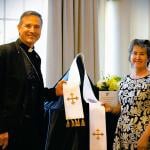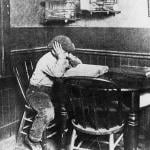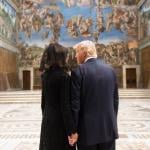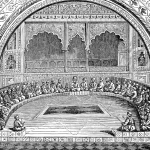That’s an intriguing thought. In Forbes magazine, John Farrell mulls:
A pope who’s also a scientist is rare. But these days even parish priests who are scientists are not exactly common.
To be sure, everyone knows the name of Gregor Mendel, the founder of genetics. And there’s my hero, the Belgian priest and physicist Georges Lemaître, who came up with version 1.0 of The Big Bang.
But there used to be many more.
A few years ago, Physicist and author Stephen Barr discussed the many contributions that Catholic priests made to science in the early days of the Scientific Revolution. And they are not insignificant.
he first asteroid was discovered by a priest named Giuseppe Piazzi. Fr. René-Just Häuy is called the “father of crystallography.” Fr. Christoph Scheiner was one of the discoverers of sunspots and discovered the rotation of the sun on its axis.
An extremely important effect in physics called the “diffraction” of light was discovered by Fr. Francesco Grimaldi in the seventeenth century (something no physics textbook that I have ever seen bothers to mention, so that few scientists are aware of it). One of the top biologists in the world in the eighteenth century was Fr. Lazzaro Spallanzani. Among his many accomplishments was to disprove the theory of “spontaneous generation.” (Pasteur later made use of Spallanzani’s work in doing his own famous experiments disproving spontaneous generation.)
Many of the figures listed by Barr were from before Darwin. Some were contemporaries of Galileo. And while the Inquisition’s treatment of Galileo dampened the enthusiasm of priests for the Copernican system, it did not discourage the study of science among the clergy in general.
It’s ironic, but if I had to nominate one pope who probably did more damage to the Church’s attitude to science and the clergy in the past two centuries, it would be the man who was pontiff exactly one hundred years before the current one.
In his study, Roman Catholicism and Modern Science, Irish historian Don O’Leary paints a depressing portrait of the anti-intellectual Pope Pius X [1903-1914].
“Pius X was not intellectually gifted,” he writes, “and was ‘so ill at ease in the presence of all learning’ that the Holy Office [Inquisition] was given freedom of action in dealing with those who were regarded as modernists.”
While the hostility of Pius X toward scholars is no longer prevalent in today’s Vatican, there is not much evidence that science is encouraged in the seminaries (although the study of bioethics has certainly blossomed).
Now that the Pope is himself a scientist, will he encourage the study for its own sake?
Perhaps in the next few years, in the grand tradition of his own order, the Jesuits, Pope Francis will inspire a new generation of seminarians to go into the sciences before they take their Holy Orders.















